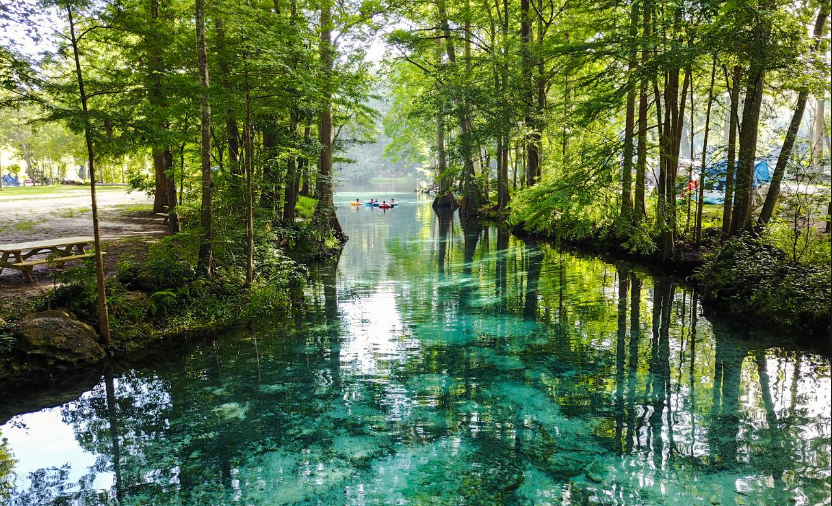Nestlé is asking to take over 1.1 million gallons of water a day from the ecologically fragile Santa Fe River without paying for it.
As we’ve previously reported, the company requested a permit from the Suwannee River Management District which would renew their right to pump water from the springs, as they’ve been doing since 1998. The expired water use permit is held by a local company, Seven Springs.
RELATED STORY:
Ginnie Springs is “in recovery” after years of overpumping, according to the Suwanee River Water Management District. It received an F rating for its flow, and an overall rating of D+ by the Florida Springs Institute.
Dr. Bob Knight, Executive Director of the Florida Spring Institute states:
The Santa Fe springs’ flow reductions are the direct result of too much groundwater pumping.
Groups like the Suwannee Riverkeeper are “opposed to continued promiscuous issuance of permits to withdraw water from the Floridan Aquifer, which is already overtaxed and sinking.
Nestlé is defending their business, claiming without evidence that the spring water is a “rapidly renewable resource.1
RELATED STORY:
RELATED STORY:
Unrelated to Florida, but important to understanding the values of this company, Nestlé openly admits to using child labor in its cocoa supply chain right on their website. “Nestlé is no different” than other companies sourcing cocoa in Côte d’Ivoire and Ghana, they say. The wording they use tries to absolve them of guilt, and the site lists their supposed efforts in “tackling child labour,” but the fact remains the same: they are knowingly profiting from the exploitation of children overseas.
RELATED STORY:
Dr. Bob Knight wrote an op-ed titled “Not One Drop More.” In it, he writes:
The simple truth is that every gallon of groundwater that is pumped to the land surface and not returned to the aquifer is one less gallon contributing to spring flow.
The state’s answer to Seven Springs and Nestlé must be ‘No!’ There is no way that these corporation’s desire for more profit is a higher priority than the health of our region’s springs. It is not in the public’s best interest to dry up any of Florida’s artesian springs. Healthy springs support a vast and abundant assemblage of charismatic and endangered wildlife, nourish our many rivers and lakes during droughts, and are the sought-after playground for tens of millions of visitors each year.1
CLICK HERE to tell the Suwannee River Water Management District that you OPPOSE this application.
In addition to wanting to take water from Ginnie Springs FOR FREE, Nestlé, by continuing to market bottled water, is contributing exponentially to the global plastics problem that desperately needs our attention.
RELATED STORY:
Below you will see additional tips on how to express your concerns over this situation.
Express your concern to the Suwannee River Management District
Non-profit group Our Santa Fe River has asked the public to comment against Nestlé using the official government e-Permitting system:
“This is not a petition. This is not a social media platform. This is the real government deal.”
To place your comment, go to the permit’s page and click on the link reading “To comment or receive notifications.”
You can also follow this link, which will take you directly to the public input capture for permit #2-041-218202-3.
Choose the option for “I oppose this application.”
For your comment, be sure to pressure the staff to do the right thing based on state law.
RELATED STORY:
Florida Statutes require that water permits be “consistent with the public interest,” and that the proposed use of the water has a “reasonable-beneficial use,” defined as “necessary for economic and efficient utilization.” (F.S. Chapter 373 Part II)
It’s very important that your comments address these issues specifically, as these decisions are made not because of emotions or logic, but because of written guidelines in law.
Even if you don’t live in Florida, please submit your opposition. These natural springs are great for tourism revenue, and turning them into sinkholes is obviously bad for the bottom line. This addresses the “economic” concern in the Florida Statutes.
Some good news: The permit request cannot move forward “for now,” because the original application that Seven Springs filed in March was incomplete, according to Lindsey Garland, the Public Communications Coordinator of Suwannee River Water Management District. Still though, it is essential that the public express their concern. The application could easily be corrected for the process to continue.












